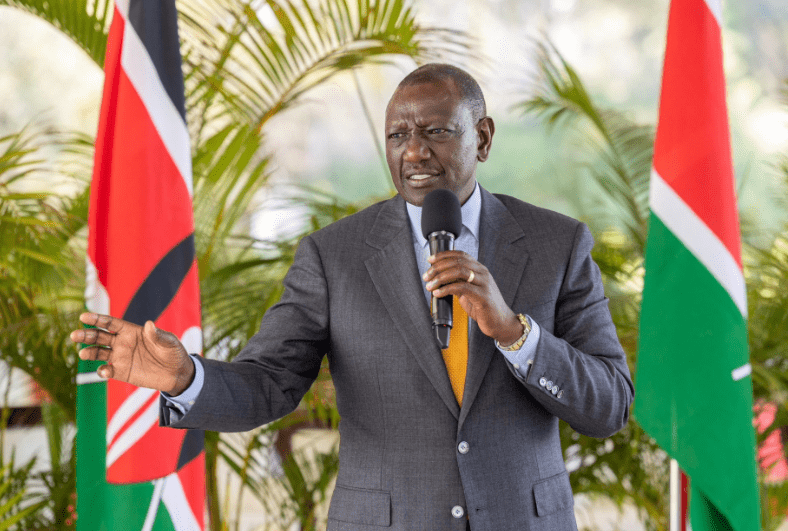Ruto failed promises, trust loss crippling country governance

Two years into the Kenya Kwanza administration, the country has been thrown into a season of high-octane politics that have threatened to cripple government operations.
This year, President William Ruto has been confronted with a tougher period in office than any of his predecessors to the extent that he has been forced to drop some of the decisions he has made himself.
His government is becoming unpopular among Kenyans; after the majority of the policies he has formulated appear to oppress the public more than improving their livelihoods as he has promised them during the campaigns for the 2022 General Elections.
The disquiet among Kenyans over Ruto’s unpopular economic transformation policies reached the boiling point when Gen-Z took to the streets to protest against the oppressive 2023 Finance Bill, which Ruto was hell-bent to sign into law despite imminent discontentment among Kenyans.
Through the defunct Bill, the government would have subjected Kenyans to additional taxes to fund projects at a time when they were already burdened by the high cost of living.
Kenya Kwanza inner circle
Gen-Z protests were staged when cracks had started developing within the inner circles of the Kenya Kwanza government after months of concealed fallout between President Ruto and his Deputy Rigathi Gachagua.
After bowing to pressure mounted by the youthful protests, Ruto dropped the Finance Bill despite having marshalled a majority of MPs to vote yes for the proposed legislation.
Some semblance of calm was witnessed with the President even resuming his frequent international travels having been grounded due to the unrest caused by the nationwide protests that had morphed into anti-government revolt.
Two months after the deadly 2023 Finance Bill debacle, the country is again in unfamiliar territory with President Ruto leading the ousting of his deputy Gachagua.
Ruto and Gachagua are now fighting in court over the Deputy President’s office after Parliament impeached the latter last week prompting the President to appoint Interior Cabinet Secretary Kithure Kindiki as the new DP.
Growing distrust
An independent government agency is now raising concern that there exists growing distrust among Kenyans and the current government over the new developments in the governance system that have far-reaching consequences in their lives.
National Cohesion and Integration Commission (NCIC) says that the youth are most affected as the government appears not to understand their challenges to address them adequately.
According to the Commission, the Gen-Zs who are deeply immersed in a digital world, have redefined trust in the transactional sphere, contrasting the prevailing climate in Kenya.
The Commission argues that the youth are engaged in a struggle with a government caught up in a crisis of confidence, plagued by corruption, inefficiency, and broken promises. Corruption has been ranked as the most pressing problem after unemployment and poverty, further eroding trust.
“The youth’s low trust in the government’s ability to deliver has exacerbated youth scepticism towards government promises. The youth are increasingly questioning the government’s commitment to addressing their concerns with 20 per cent (one in every 10 young people) of the youth expressing outright distrust,” NCIC says in its newly released document titled Transgender Conversations.
In the policy document which aims to spur political decency and accountability in the country, the Commission stated that Kenya is grappling with a decline in civility and respect – manifesting in various forms including the rampant use of derogatory language, blatant disregard for elders, and a general erosion of cultural values.
“The proliferation of social media platforms has exacerbated the problem, creating a breeding ground for using dangerous speech. While this is a societal issue, the actions and conduct of public figures can significantly influence public behaviour. Leaders must model the kind of respect and civility they wish to see in the nation,” the Commission emphasized.
Additionally, NCIC noted that bad governance is resulting in poor service delivery in the public service despite the existence of legal instruments and watchdog institutions to regulate and monitor the ethical conduct of public officials.
“The extravagance and opulence exhibited by a select few within senior officials in the Kenyan government has widened the divide, particularly between politicians and the youth, creating a scarcity of relatable role models for the youth,” NCIC said.
It adds: “Tokenistic gestures exhibited by diverting the attention of the youth through sports and entertainment, have only served as temporary distractions rather than substantive solutions. These tactics have further eroded trust between the government and the citizenry. The youth, exhibiting a thirst for involvement and participation in governance issues, have vocally articulated their grievances, pointing to rampant corruption, bureaucratic inefficiency, poor service delivery, and a growing disparity between a highly educated yet unemployed populace and a privileged elite.”
NCIC revealed how the youth despite their abilities are often excluded from decision-making processes, with the older generation maintaining a monopoly over money and resources.
A form of power struggle, the commission said where older generations sometimes perceive younger counterparts as a threat. The youth therefore lack role models thus creating a barrier to entry into key sectors of the economy and society.
The commission also highlighted structural inequalities saying they laid the groundwork for the current social unrest among the Gen-Z population.
“Deep-rooted disparities particularly in access to economic opportunities have fueled feelings of injustice and alienation, creating a marginalised and disenfranchised youth.
“This is further compounded by the lack of upward mobility and the perception of a rigged system that has contributed to a growing sense of hopelessness among young, highly educated citizens, increasingly turning to demand for change,” NCIC said.
NCIC chairman Samuel Kobia while releasing the publication said that each generation’s story needs to be told because it is a significant building block for a better Kenya; and successive generations stand on the shoulders of the predecessor generations.










